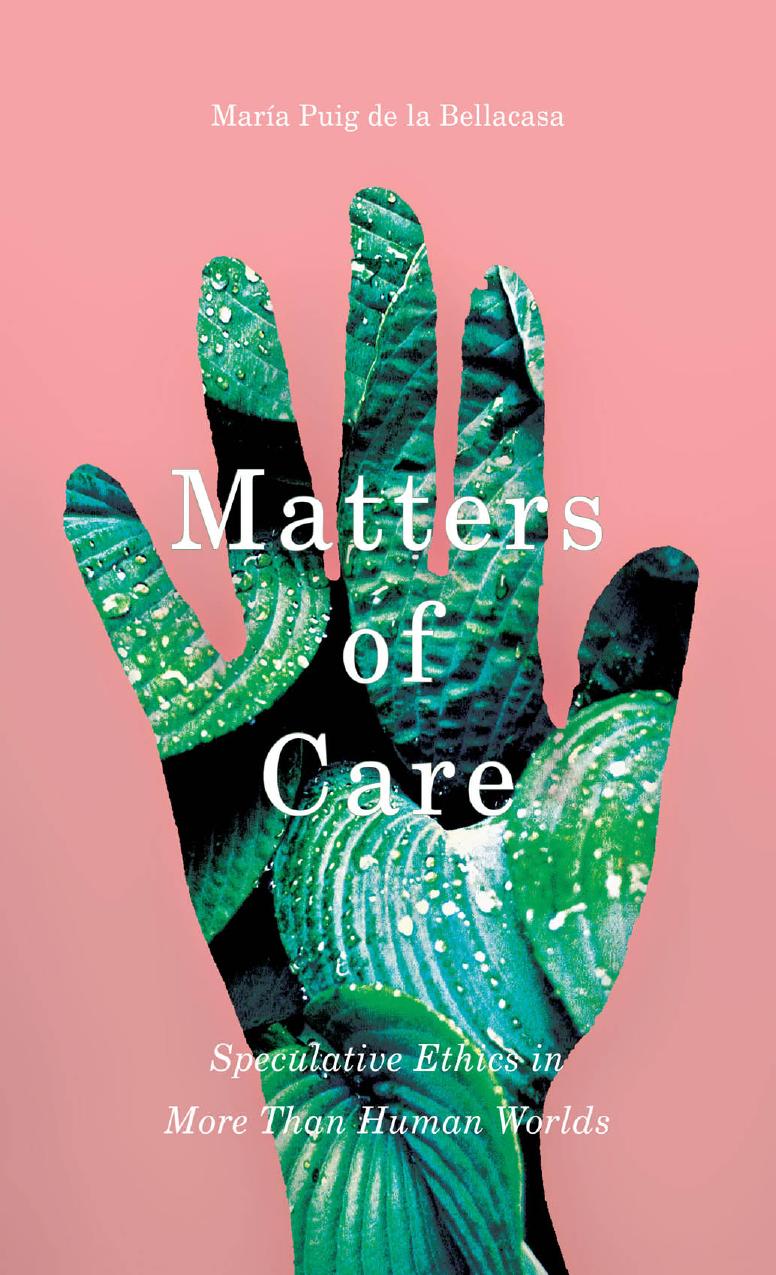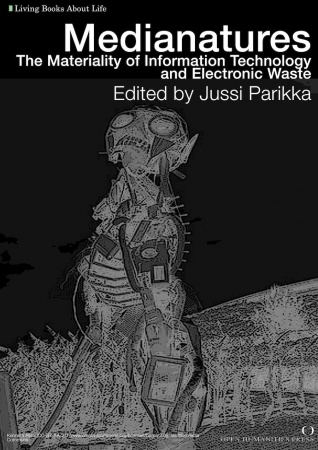María Puig de la Bellacasa: Matters of Care: Speculative Ethics in More than Human Worlds (2017)
Filed under book | Tags: · agency, biopolitics, care, ecology, ethics, feminism, knowledge, naturecultures, object, politics, soil, technoscience, touch

“To care can feel good, or it can feel bad. It can do good, it can oppress. But what is care? A moral obligation? A burden? A joy? Is it only human? In Matters of Care, María Puig de la Bellacasa presents a powerful challenge to conventional notions of care, exploring its significance as an ethical and political obligation for thinking in the more than human worlds of technoscience and naturecultures.
Matters of Care contests the view that care is something only humans do, and argues for extending to non-humans the consideration of agencies and communities that make the living web of care by considering how care circulates in the natural world. The first of the book’s two parts, “Knowledge Politics,” defines the motivations for expanding the ethico-political meanings of care, focusing on discussions in science and technology that engage with sociotechnical assemblages and objects as lively, politically charged “things.” The second part, “Speculative Ethics in Antiecological Times,” considers everyday ecologies of sustaining and perpetuating life for their potential to transform our entrenched relations to natural worlds as “resources.”
From the ethics and politics of care to experiential research on care to feminist science and technology studies, Matters of Care is a singular contribution to an emerging interdisciplinary debate that expands agency beyond the human to ask how our understandings of care must shift if we broaden the world.”
Publisher University of Minnesota Press, Minneapolis, 2017
Posthumanities series, 41
ISBN 9781517900656, 1517900654
265 pages
Reviews: Miriam Ticktin & Katinka Wijsman (Hypatia, 2017), Sonja Jerak-Zuiderent (Science & Technology Studies, 2017), James McMaster (Women & Performance, 2017), Kelly Dombroski (Journal of Cultural Economy, 2018), Stephen Healy (Journal of Cultural Economy, 2018), Elizabeth Reddy (Journal of Cultural Economy, 2018), Gerda Roelvink (Journal of Cultural Economy, 2018), Maria Puig de la Bellacasa (response, Journal of Cultural Economy, 2018), Katie Ulrich (Cultures of Energy, 2018), Garrett Bunyak (Configurations, 2018), Sarah Weiger (ISLE, 2019), Farhan Samanani (Society+Space, 2019), Richard Brons (Ethics of Care, 2019).
Commentary: Michelle Murphy (Social Studies of Science, 2015).
Interview with author (Cultures of Energy, 2018, 70 min)
Comment (0)Jussi Parikka (ed.): Medianatures: The Materiality of Information Technology and Electronic Waste (2011-)
Filed under living book | Tags: · ecology, ecosophy, electronic waste, energetics, energy, materiality, media ecology, naturecultures, technology

“Medianatures picks up from Donna Haraway’s idea of naturecultures – the topological continuum between nature and culture, the material entwining and enfolding of various agencies, meanings and interactions. Medianatures gives the concept of naturecultures a specific emphasis, and that emphasis is at the core of this living book. It is a useful concept and framework for investigating some of the ways in which our electronic and high-tech media culture is entwined with a variety of material agencies. The notion of ‘materiality’ is taken here in a literal sense to refer, for instance, to ‘plasma reactions and ion implantation’ (Yoshida, 1994: 105) – as in processes of semiconductor fabrication, or to an alternative list of media studies objects and components which are studied from an e-waste management perspective: ‘metal, motor/compressor, cooling, plastic, insulation, glass, LCD, rubber, wiring/electrical, concrete, transformer, magnetron, textile, circuit board, fluorescent lamp, incandescent lamp, heating element, thermostat, brominated flamed retardant (BFR)-containing plastic, batteries, CFC/HCFC/HFC/HC, external electric cables, refractory ceramic fibers, radioactive substances and electrolyte capacitors (over L/D 25 mm)’, and which themselves are constituted from a range of materials – plastics, wood, plywood, copper, aluminum, silver, gold, palladium, lead, mercury, arsenic, cadmium, selenium, hexavalent chromium and flame retardants (Pinto, 2008).” (from Introduction)
Publisher Open Humanities Press
Living Books About Life series
View online (wiki/PDF/HTML articles)
PDF (PDF’d Introduction with hyperlinked articles)

